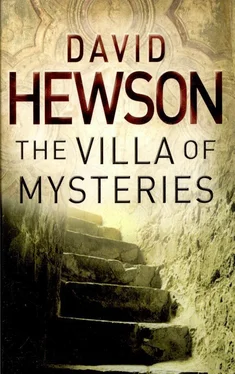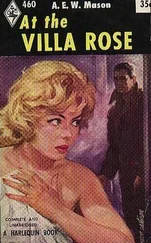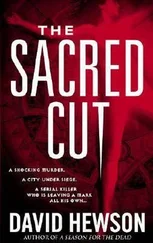The crazy god stared at the characters on the table, matching them off with the phone keypad using the point of the sword.
“It’s clever,” Vercillo added. “Just remember to use Q for zero and Z for one.” It was too. It meant you could encrypt the number “2” in any one of three ways—A, B or C—and anyone with a phone could still get the right answer in seconds. People assumed codes were designed to hide words, not numbers. As long as they kept to that idea the code was pretty much impossible to crack. It wouldn’t fool the FBI, not in the end. But it could fool a lot of people. It would fool Emilio Neri and in some curious way that was all that mattered.
The crazy god laughed and there was something wrong inside the sound.
“Is that what you want?” Vercillo asked.
The mask didn’t say a thing.
“I—” Vercillo wanted praise, or gratitude even. There was nothing. “Maybe I could give you more.”
“Don’t need more,” the crazy god murmured, beginning to move, beginning to lift the short, sharp blade higher.
“You said—” Then Vercillo fell silent. There was no point in talking to a sword. There was no point in anything at all. The world was mad. The world was a mask leering at him, getting bigger, crazier with every diminishing second.
BARBARA MARTELLI HAD LIVED with her old man in a first-floor apartment on the Lateran Square. The communal front door faced the site of the first St. Peter’s built by Constantine. The place had five big rooms, a quiet view over the internal courtyard, and plenty of expensive furnishings with a personal, feminine touch. She must have bought them, Costa thought. Peroni had brought along the file from the previous night’s visit, which they’d read in the car outside. The old man had said little but the background was interesting. It contained more than either of them had expected. When they walked in Costa thought about some of the older papers, with their vague, unproven allegations, took one look at old man Martelli and knew straightaway where the money came from.
He was in his mid-fifties and skeletally thin, hunched in a shiny wheelchair, staring back at them with cold, dead eyes. Still, Costa could imagine what he would have been like in his prime. Not that different from Peroni: fit, strong, dogmatic. He didn’t look well now, and it wasn’t just grief. Costa knew that kind of sickness, recognized the signs. The patchy hair from the chemotherapy. The dead, desiccated look in the eyes. And Martelli was still smoking like crazy too. The place reeked of stale tobacco.
Martelli stared at Gianni Peroni and shook his head. “Jesus, talk about bad apples,” he snarled. “I heard you got busted from vice. Didn’t realize they busted you down this far. You enjoying it, huh?”
“Yeah,” Peroni said. “Does a man good to get kicked in the teeth from time to time. This detective stuff’s interesting too. We always used to think we had the short end of the stick in vice, Toni. We didn’t. You know why?”
The sick old man just glared at him.
“In vice,” Peroni continued, “we knew we were dealing with shit all along. The only question was how bad it was, and how much stuck to us along the way.” He waved a hand at Costa. “These guys don’t have that privilege. They try to assume everyone’s innocent before they find out otherwise. Trust me. This really cramps your style. Fortunately, I haven’t learnt that trick.”
“If you could’ve kept your pecker in your pants, you wouldn’t be needing it,” Martelli retorted.
Peroni grimaced. He really didn’t like this man. “So I keep telling myself. Why are we talking like this, Toni? Me and the boy came round here to offer our condolences. We both knew Barbara. We loved that girl. We’re in shock over what happened. So why are we making a fight out of things? You want some answers just the same as we do.”
Martelli started coughing like crazy, a cruel, rasping hack. It must have hurt. When he finished he took two gulps of snatched air then wheezed at them, “I said everything I had to say last night. Can’t you leave a father alone with his thoughts?”
Peroni pulled up a chair next to Martelli, sat down, gave Costa a look that said “watch this” and lit a cigarette. “I know, I know. It’s that asshole Falcone. He just pushes and pushes.”
Martelli snorted. “I remember him. He wasn’t such hot stuff. How come he made inspector? Don’t they have any reliable men left these days?”
“Some,” Peroni replied. “A few. How’re you doing? People still ask after you.”
“Don’t give me that shit. I hadn’t seen a soul from the Questura in months till last night. Now I can’t sleep for the doorbell ringing.”
Peroni shrugged and stared at the walls.
“Is it long since you retired, Signor Martelli?” Costa asked.
“Six years. The moron I was working with complained about my cough. Next thing you know they’re doing X-rays, sending me down to the hospital. Medical leave. Compulsory retirement.”
“He did you a favour,” Costa said. “My father died of cancer. The sooner it’s caught—”
“A favour.” Martelli’s dark eyes stared back at him. “That’s what you call it?”
“Yes.”
“Well, here I am. Still coughing. Still feeling like shit. With my hair falling out and my guts with a mind of their own. Some favour. I could’ve worked a few more years. I could’ve done the job. Then what? Maybe they side me with some dumb kid who doesn’t know his left hand from his right and gets me walking straight into one of them nice immigrant types we got working the Termini dope run these days. All knives and guns and shit we never had to deal with till they came along. Hell, I wasn’t cut out for retirement.”
The man seemed consumed by his own self-pity. They’d come to talk about the death of his daughter. Instead it seemed Toni Martelli only had time to think about himself, how everything that happened affected his own fragile identity. Costa tried to recall Barbara more closely and found it impossible. There was, now that he came to think of it, something fleeting about her, a kind of brittle anonymity masquerading as friendliness. Maybe that was all an act too, like the show she put on of being just another cop. There had to be some answers in this over-grand apartment and in the head of her father. He knew that nothing would be prised out into the light of day readily. Toni Martelli had crawled out from underneath some serious corruption allegations scot-free, and went on to take home a full pension. He wasn’t the type to offer up the truth for nothing.
“So you and Barbara must have worked together?” Costa asked.
“Depends what you mean by ”together.“ I worked vice and dope mainly. She was traffic. We met in the corridors. We said hello. We didn’t talk about what we did if that’s what you mean. A good cop leaves things in the office. Maybe you’re not old enough to understand that.”
“Were you glad she joined the force?”
He shuffled, uncomfortable. “Yeah. At the time. Why shouldn’t I be?”
“Who gave her the job, Toni?” Peroni asked.
“Don’t recall.”
Peroni scratched his crew-cut, thinking. “One of those bent guys you liked, huh? What was the name of that big goon you were pally with? The one that did time for taking money from Neri a couple of years ago? Filippo Mosca, wasn’t it?”
“I don’t have to take this shit,” Martelli wheezed.
Peroni smiled, leaned over and took hold of his scrawny knee. “That’s the trouble, Toni. That’s the worst thing of all. You do.”
“Where’s her mother? Does she know?” Costa wondered.
“Back home in Sicily. Of course she knows.” Martelli’s dead eyes glared at him. “They got TV and papers in Sicily, haven’t they? How couldn’t she know?”
Читать дальше












